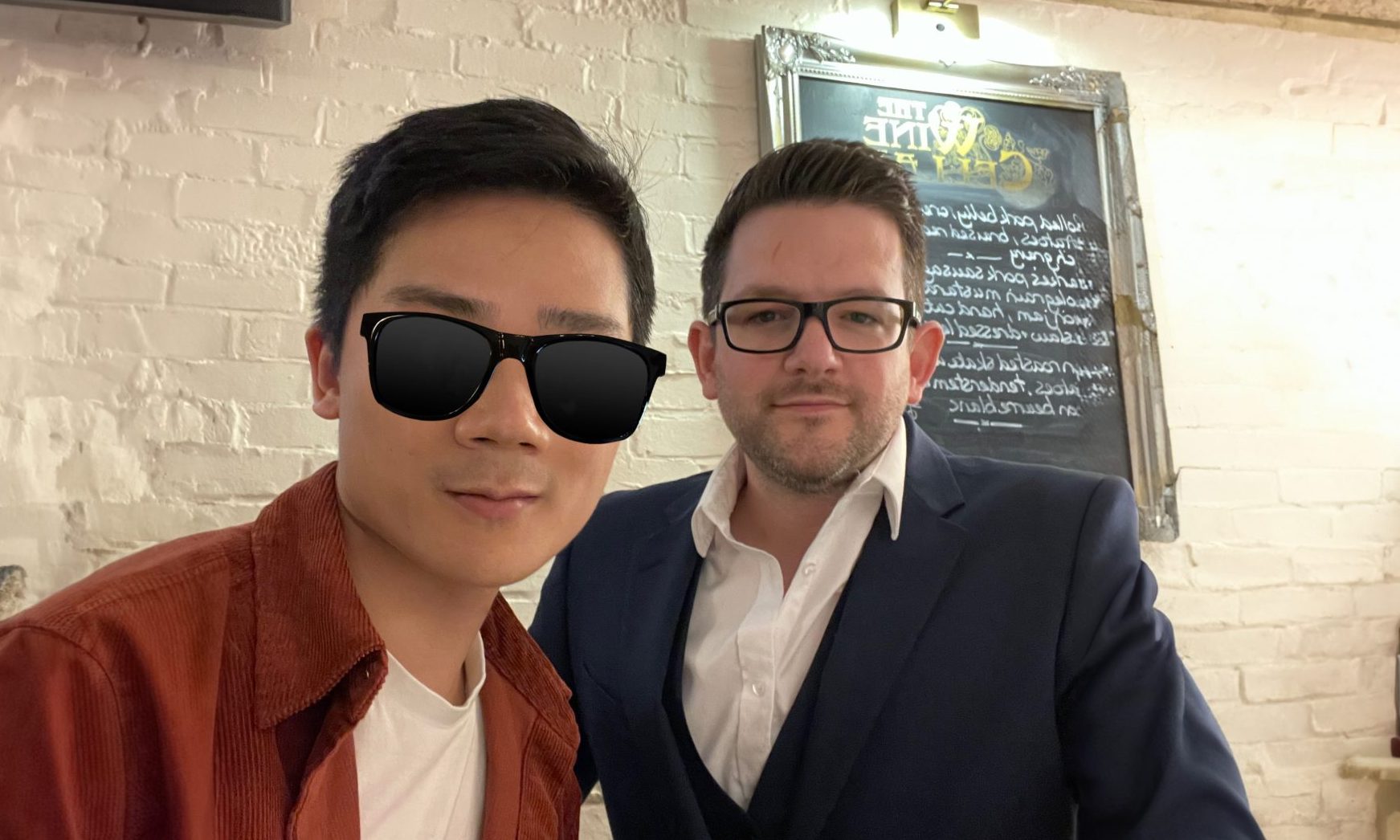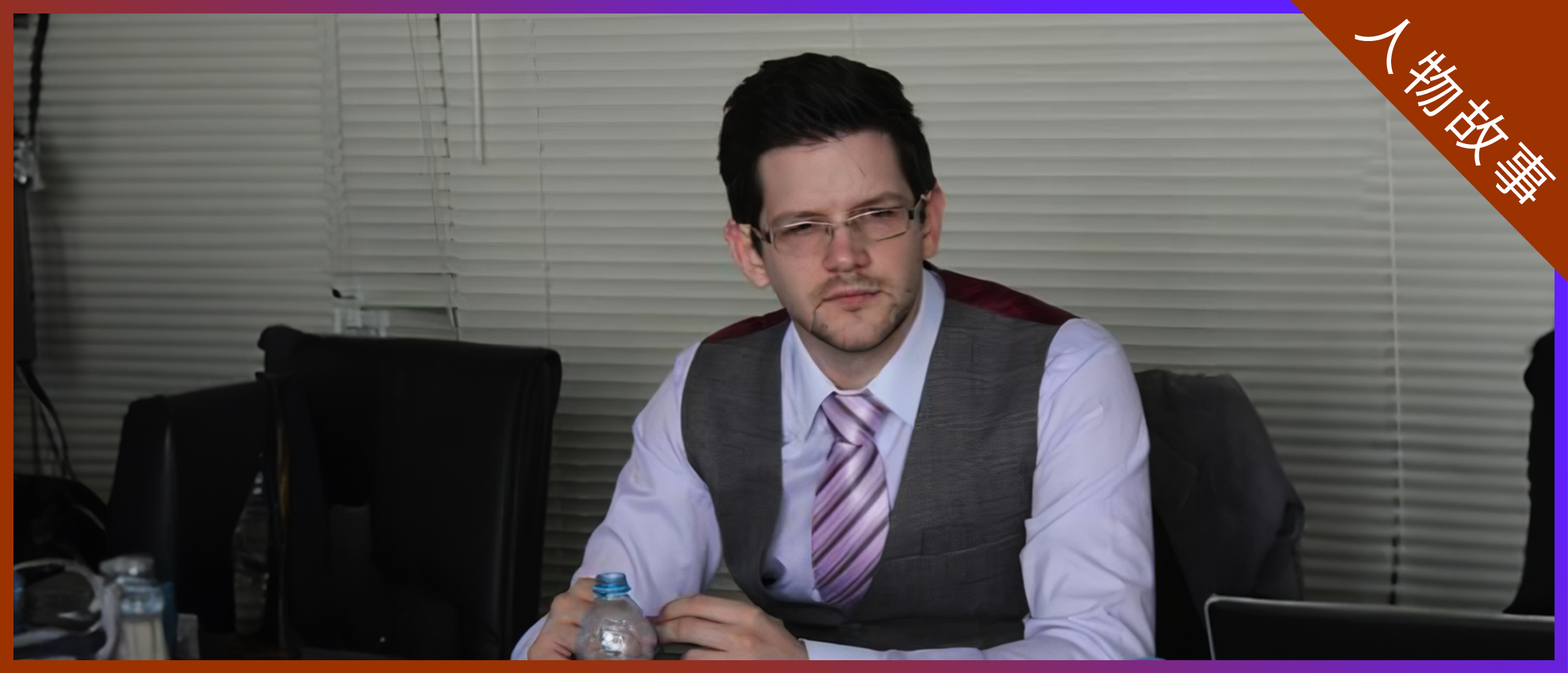Hi, this is Fong. How are you?
I’m back.
I recently wrapped up my graduation thesis and made the move to London. I finally managed to tick off that box of pursuing postgraduate studies before hitting the big 3-0, Something I’d always regretted not doing before.
Roughly speaking, I’ve been a resident of the UK for about a year now, and during this time, I’ve had the pleasure of meeting many new friends, each of whom has brought a unique experience to my life. Today I’d like you to meet Richard, a British entrepreneur.

My first encounter with Richard was during our class. I was trying to round up some classmates for a gym session, and that’s when our paths crossed. I was genuinely taken aback by his fluency in Chinese and his authentic Shanghai accent.
At that time I was new to the UK, not familiar with the new environment, and the Chinese community in the small town I stayed was rather sparse. so basically I was in the situation of struggling to use English while overcoming the language difficulties, but hearing Mandarin was like a comforting embrace.

As we got to know each other better, I discovered that Richard was married to a lady from Shanghai who had recently returned to the UK to further his studies, and his story was also fantastical. After earning his Astrophysics degree at 21, he embarked on a solo adventure to China, where he stayed for a staggering 18 years.
Boundless imagination and remarkable creativity are the labels for him. I can see he’s a living fusion of Chinese and English cultures. When I learned that he had transformed his knowledge of Chinese culture into a game, my curiosity about him piqued, and that’s when I decided to sit down with him for an interview.

Q&A Fong & Richard
| Why did you initially decide to embark on your adventure in China?
Honestly, it was a spur-of-the-moment decision. After obtaining my Astrophysics degree, I had plans to take a year off in the UK before pursuing my master’s and doctoral degrees (though that never quite panned out). During a casual conversation with a friend from Shanghai, he suggested, “Why not spend a year in Shanghai?” And just like that, the journey began. I saved up some money and departed two months after my final exams.
I didn’t even bother attending my graduation ceremony. I told myself it would be a year of travel and language learning, and then I’d return home. However, as I touched down in Shanghai and spent a few weeks there, I had an inkling that this journey would extend far beyond a year!

| Why were you so certain you’d stay longer than a year? Haha.
The answer to that is surprisingly simple: I had fallen in love with the place. It felt like where I truly belonged, and the thought of returning to the UK didn’t even cross my mind.
| What challenges did you encounter in China, and how did you overcome them?
The language barrier was undoubtedly the most significant challenge. Initially, I had planned to befriend people who weren’t fluent in English to expedite my Chinese language skills, given my initial one-year plan. While it was effective, it was also incredibly challenging! Over time, as my friendships in China deepened, the language barrier became more apparent in complex conversations.
Then there were the healthcare experiences. Communicating with doctors often felt like conversing in a completely different language, and it took me a while to confidently attend medical appointments on my own.
Lastly, it was about integrating into society. Chinese people are incredibly welcoming, making me feel at ease wherever I went. However, forming close relationships proved difficult. The longer I knew someone, the more evident the language and cultural differences became. It took me a substantial amount of time to truly become part of the community.

| What was the initial motivation behind creating a game centred around Chinese culture?
At that time, I had a child, and I couldn’t help but think that no matter where he went, he would always stand out. In China, he’d be a “混血” (literally, mixed blood), while here in the UK, he’d look Chinese. He’d be different no matter where he went, and I wanted to ensure he held no negative perceptions about any part of his diverse heritage. I could answer questions about the UK and British culture, but my knowledge of China back then was fairly superficial. So, I felt compelled to learn more about it.

| Cool. So, your exploration of Chinese culture started with the intention of sharing it with your son?
Exactly, and the first thing I delved into was quite overwhelming. I initially attempted to read the original text of the “易经” (I Ching), but it proved to be quite a challenge to grasp. Those profound ancient texts were beyond my understanding at that point, considering my limited familiarity with ancient literature. Later, a friend recommended “山海经” (Classic of Mountains and Seas) to me, a title I hadn’t come across before. I gave it a shot, and I fell head over heels for it. However, the more I read it, the more I couldn’t understand why it hadn’t been made into a proper game.

| Could you give us a brief overview of the game?
Certainly! This game is a collectible card game with a focus on warfare and strategy, playable by two or more participants. Players assemble their card decks using elements from Classic of Mountains and Seas, including mythical creatures, mountain deities, and divine beings. The game also incorporates elements from Chinese Buddhism, Daoism, historical narratives, and cultural legends, providing an immersive experience that instantly resonates with Chinese players while offering an enthralling and fresh journey for international enthusiasts.

The ultimate objective of the game is to outmanoeuvre and defeat opponents, with victory reserved for the last player standing. The initial version boasts over 1,000 distinct cards, and I’ve already begun developing ten additional expansion packs, intending to release one annually. These expansions aim to enrich the gameplay and keep players engaged for the long haul.
| As a British individual, how do you ensure that the games you develop will be accepted by Chinese players?
That’s an excellent question and one that has occupied my thoughts since I embarked on this six-year-long journey. Regarding the game itself, the TCG market in China is still in its infancy. Chinese players have encountered card games like Magic: The Gathering, Pokémon, Yu-Gi-Oh!, and Hearthstone. While there have been initial successes (such as Hearthstone), there is still ample room for growth.
My hope is that, given my game’s foundation in Chinese mythology, religion, and culture, it can strike a chord with my target audience in a way that Western-based games cannot.

My modest market research within Chinese communities suggests that Chinese players find it challenging to immerse themselves in these games due to their unfamiliarity with the underlying legends. Additionally, the aesthetics of these games don’t entirely align with Chinese players’ preferences, and the learning curve for new players, particularly those new to TCGs, can be steep and daunting.
I plan to continue my market research, but I believe this serves as a solid starting point. Understanding what Chinese players desire from this game is crucial to crafting something they’ll wholeheartedly embrace.

| If the game is released outside of China how do you ensure that overseas users will like it?
Trading card games (TCGs) are tremendously popular in the West. The game is poised to begin beta testing shortly, and we’re planning extensive collaborations with numerous individuals to ensure it’s enjoyable, immersive, highly replayable, and balanced. It will feature captivating characters and offer an immersive, replayable experience.
The incorporation of Chinese mythology, religion, and culture in this strategy game format sets it apart and makes it a hot prospect. Encouragingly, forthcoming games like “WuKong” have already demonstrated that Chinese mythology and culture hold immense appeal for Western players.

| What has been the most significant challenge throughout your entrepreneurial journey?
Managing time has been the biggest hurdle! Over the course of six years, I’ve been researching and developing this game in my limited spare time. My job, raising two children, and other hobbies have demanded their share of my time. My aspiration is to create a game that remains faithful to historical materials while ensuring it’s fun and meaningful.
It’s been a demanding journey, and although I recognise the game is far from perfect, ongoing testing will be instrumental in its refinement. I take great pride in my efforts thus far!

| What are your future plans?
In a nutshell: a physical card game, followed by annual expansion packs, a digital game version, a video game, and eventually, a movie. It’s an ambitious dream, but when I observe Egyptian and Greek culture consistently presented in games, video games, and movies year after year, I can’t help but wonder why Chinese culture isn’t accorded the same treatment.
In my Western market research, when I’ve inquired about people’s knowledge of Chinese mythology, religion, and culture, the responses have often boiled down to dragons, phoenixes, Sun Wukong, kung fu, Buddhism, and occasionally, a mention of the Terracotta Army. Yet, there’s so much more to explore, and I dream of promoting it at every available opportunity.
I genuinely believe that using entertainment as a vehicle for cultural introduction is one of the most effective approaches. I’m living proof of this; I’ve never delved into books about Egyptian or Greek mythology, yet I can readily name numerous gods from both pantheons and recount many of their stories and legends.

| If you had the chance, what advice would you offer to those embarking on their own entrepreneurial journey?
The entrepreneurial path is fraught with challenges and uncertainties, but remember, each step you take is a stride toward realising your dreams. Have faith in yourself, keep learning, progress relentlessly, and never surrender. Your passion and determination are your most potent assets; harness them to guide your journey towards success!
Talking with Richard was was filled with fervour, and his storytelling ability possesses a natural allure. Perhaps this is why he has the knack for attracting investments. Through him, I glimpsed a unique perspective on Chinese culture and its magnetic pull on the world. It was a captivating encounter.

As a foreigner residing in the UK, I can relate to the Richard who first set foot in China, and his unwavering determination and persistence are traits I aspire to emulate. Language and cultural barriers may present temporary roadblocks, but they cannot deter the exploration of an inquisitive mind.
This is Fong, and I’m grateful that you’ve read the whole article! I’d like to use the stories of 100 friends around me to bring you to know more aspects of the world and become a better version of yourself. Feel free to follow me!


